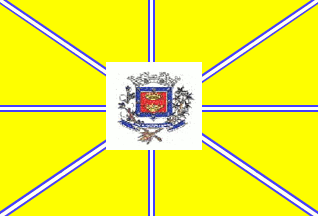 image by Dirk Schönberger,
17 October 2012
image by Dirk Schönberger,
17 October 2012Source: http://conchal.sp.gov.br/source/conchal/simbolos.jsp

Last modified: 2012-11-04 by ian macdonald
Keywords: sao paulo | conchal |
Links: FOTW homepage |
search |
disclaimer and copyright |
write us |
mirrors
 image by Dirk Schönberger,
17 October 2012
image by Dirk Schönberger,
17 October 2012
Source:
http://conchal.sp.gov.br/source/conchal/simbolos.jsp
A yellow flag with union-jack style upright and diagonal white crosses fimbriated grey with the municipal arms on a white rectangle in the centre.
Official website at
http://www.conchal.sp.gov.br
Dirk Schönberger,
17 October 2012
Conchal was originally made of three estates named Nova Zelândia, Ferraz and Leme. This territory was divided into two colonization nuclei, Visconde de Indaiatuba and Conde de Parnaíba, by Decree No. 2,020 of 28 March 1911. The first directors of the nuclei were Antonio de Queiroz Teles and Antonio Benedito de Oliveira Ferraz, respectively. The inauguration of the railway station on 20 November 1913 boosted the development of the colonies, which were soon emancipated as the district of Engenheiro Coelho, part of the municipality of Mogi Mirim, by Law No. 1,275 of 20 December 1919. In 1944, the local community was strongly divided into two factions, the "araraenses" asking the transfer of the district from Mogi Mirim to Araras, and the "mogianos" opposed to the transfer. The status quo was preserved, while the struggle resumed through the rivalry between the two football clubs, the "araraense" Associação Esportiva Conchalense and the "mogiano" Conchal F.C. On 5 April 1948, the leaders of the two factions met in Cinema Paratodos to set up a compromise. In a plebiscite organized on 24 October 1948, the inhabitants of Conchal approved the project of municipal emancipation. The municipality of Conchal was established on 9 April 1949.
The local hero of Conchal is Valéria Melo Peris, elected "Miss Brazil"
on 12 April 1994 and "Nuestra Belleza Internacional" (Our Beauty
International) the same year. Local journalists compared her legs to
those of Cyd Charisse. Her marriage in 2009 with a local businessman,
Otair Guimaraes, was deemed "one of the smartest marriages of the year".
http://www.ovadiasaadia.com.br/printcolunistas.cfm?id=fMeqr&fatos
The flag of Conchal is yellow with a thin blue-white-blue cross and saltire and the coat of arms inscribed in a white rectangle placed in the middle of the flag. The coat of arms, on the flag, represents the municipal government. The cross and saltire represent the influence of the municipal power all over the municipal territory.
A photo of the flag, dated 12 September 2011, seems to indicate that the saltire and cross are bigger than on the images, and that the white stripe of the crosses is slightly wider than the blue ones. http://deputadomacris.wordpress.com/2011/09/12/deputado-vanderlei-macris-recebe-titulo-de-cidadao-conchalense
The coat of arms is "Gules a Count's coronet and a Viscount coronet or per pale a bordure azure eight scallops argent. The shield surmounted by a six-towered mural crown argent. The shield supported dexter by a branch of cotton and sinister by a branch of cassava. Below the shield a scroll azure inscribed with the motto 'PAZ E PROSPERIDADE' [Peace and Prosperity] in letters argent". The Samnitic shield, of French origin, was the first style of shield introduced to Portugal. Accordingly, it is used to evoke the early colonists and builders of the Brazilian nation. The six-towered mural crown represents a third-rank town, seat of a municipality. Gules (red) means audacity, intrepidity, courage, and valiance, characteristic of the pioneers who settled the two nuclei of colonization, Conde de Parnaíba and Visconde de Indaiatuba, represented by a Count* and a Viscount**'s coronet, respectively. The bordure is a symbol of protection, favour and reward offered to those who support the leader - here the two nuclei - against the enemy. Azure (blue) is a symbol of justice, nobleness, perseverance, zeal and loyalty. The shells ("conchas") make the arms canting. The shell is a symbol of patience and contentment. Cotton and cassava are the main crops growing on the fertile soil.
*Antônio de Queirós Teles, Count of Parnaíba (1831-1888) was a local coffee grower, lawyer and politician. He served as the President of São Paulo Province in 1886-1887 and promoted the colonization of the hinterland of the State, presiding the Companhia de Estradas de Ferro Mogiana railways (1873-1886). The railway was located close to river Parnaíba, explaining the nobility titles of Baron (31 December 1880), Viscount and Grandee ( 7 May 1887) and Count (3 December 1887).
**Joaquim Bonifácio do Amaral, Viscount of Indaiatuba (1815-1884) was
a local coffee grower and politician. A leader of Partido Liberal, he
served as Vice Governor of São Paulo Province. Abolitionist, he
introduced paid work in 1852 in the Sete Quedas Estate. He was made
Baron (16 February 1876) and Viscount (19 July 1979) of Indaiatuba.
The nobility title is linked to a municipality of the São Paulo State.
Ivan Sache, 3 November 2012